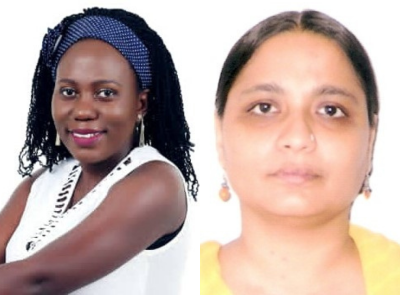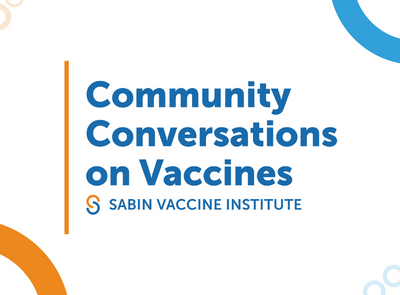Engaging Communities to Prevent Cervical Cancer with HPV Vaccination: Lessons from India and Uganda with Rehana Riyawala and Doreen Tuhebwe
Rehana Riyawala and Doreen Tuhebwe discuss HPV vaccination efforts and innovative public health approaches in the HPV space.
Sabin Vaccine Institute’s Community Conversations on Vaccines, presented by Immunization Advocates, explores issues related to vaccines and immunization in low- and middle-income countries through discussions with close-to-community professionals, including health workers, journalists, and researchers.
In this episode, co-hosts Vince Blaser and Francesca Montalto of the Sabin Vaccine Institute are joined by Rehana Riyawala, vice president at Self-Employed Women’s Association (SEWA), and Doreen Tuhebwe, research fellow at Makerere University School of Public Health (MakSPH). They discuss HPV vaccination efforts, the prevalence of cervical cancer, and innovative approaches to addressing public health challenges in the HPV space.
Rehana has been with SEWA since 2012. She oversees SEWA’s operations in districts, focusing on empowering women in informal economies through livelihood support, capacity building, microfinance, and social security initiatives. SEWA is the single largest Central Trade union in India, with a membership of over 2.5 million poor, self-employed women workers from the informal economy across 18 states.
Doreen is a 2019 cohort partner of Sabin Vaccine Institute’s Social and Behavioral Research Grants Program. She is a founding member of the Women in Global Health, Uganda Chapter, and the MakSPH-Master of Public Health Alumni Association. Doreen was a speaker at Sabin’s Vaccination Acceptance Research Network 2nd Annual Conference (VARN2023).
Learn more from Rehana and Doreen by checking out the key takeaways of this episode below or the transcript.
Key Takeaways:
- 07:05 – 13:04 – SEWA’s Research on HPV Vaccine – SEWA conducted research in 2018 to support the introduction of the HPV vaccine into India’s public health programs, aiming to prevent cervical cancer. Leveraging their extensive experience and women’s leadership, SEWA focused on understanding community knowledge, perceptions, and concerns toward vaccines and cervical cancer. The study covered rural and urban areas in Gujarat, Rajasthan, Sikkim, and Uttar Pradesh. Data was collected using qualitative and quantitative methods, including interviews and surveys. The study revealed stakeholders’ recognition of the urgency to prevent cancer and widespread acceptance of the HPV vaccine after awareness campaigns. Mothers showed improved decision-making skills and expressed willingness to learn more about cervical cancer and the vaccine. Community meetings led by SEWA leaders, ASHA workers, and doctors were deemed effective in engaging families. The study emphasized the need for awareness among frontline health workers and recommended vaccine delivery at convenient locations, such as schools or primary health centers. Thanks to SEWA’s information and education efforts, 95% of interviewed mothers agreed to vaccinate their daughters.
- 13:05 – 18:27 – Empowering Peer Educators for Enhancing HPV Vaccine Uptake in Uganda – Doreen’s research in Uganda during 2019 and 2020 focused on the low uptake of the HPV vaccine, despite its launch in 2015. The completion rate for the second dose was only forty-one to forty-four percent, indicating lost opportunities. Concerned about this, the Ministry of Health sought social behavior interventions. With a research team, Doreen identified HPV vaccination as a reproductive health challenge. They conducted participatory research with girls aged ten to fifteen, exploring factors influencing vaccination and recruiting peer educators. Engaging community health workers and using the local language, Doreen empowered the peer educators to advocate for the vaccine. Messaging focused on cervical cancer prevention and reproductive health, avoiding stigma around sexual transmission. The peer educators successfully referred vaccinated girls and improved attitudes towards the vaccine, acting as a linkage to health facilities. Caretaker consent and social influence also played a role in increasing vaccination rates. This peer-to-peer and social influence approach proved feasible in an urban poor community lacking access to knowledge and resources.
- 18:27 – 23:26 – Strategies for Improving Vaccine Coverage and Integration – Policymakers and leaders must consider strategies to effectively reach the target population and scale up vaccination efforts. In an urban poor community, there are diverse groups, including long-term residents, refugees, and rural-urban migrants, each with unique vaccination needs. Identifying and addressing these differences is crucial. Language and integration issues have also hindered communication and understanding. Governments should prioritize context-specific demand creation and integration of vaccines to ensure no one is left behind.
- 24:48 – 28:13 – Addressing Barriers to HPV Vaccination in Low-Income Communities – In India, low-income families in the informal sector face challenges accessing vaccines, resulting in high rates of unvaccinated children. This poses health risks and perpetuates poverty cycles. To successfully implement the HPV immunization program, it is crucial to understand the factors contributing to low vaccination rates and address them. One key factor is limited access due to time and resource constraints, as these families often migrate for work or live far from health facilities. Cultural beliefs and misconceptions also play a role. Overcoming these barriers requires a multi-stakeholder approach involving the government, healthcare professionals, communities, local leaders, CSOs, and NGOs is essential. A comprehensive communication strategy, including localized materials like posters, videos, and role plays, can help increase acceptance and retention. Increasing regional accessibility is critical, with vaccination services available at schools, healthcare facilities, and outreach programs. Also, conveniently located camps and flexible schedules can encourage higher vaccine uptake by alleviating concerns about taking time off work.
Connect with our guests
Learn more about Doreen Tuhebwe’s work:
- Sabin Initiates Locally-Led Vaccination Acceptance Research Program in Uganda, India and Sierra Leone
- Sabin Social and Behavioral Research Project: Improving HPV Vaccine Acceptance Through Peer-to-Peer Education Among Adolescent Girls in the Urban Poor Setting of Kisenyi, Kampala, Uganda
- Women in Global Health – Uganda Chapter
Learn more about Rehana Reyawala’s work:
Meet Our Guests











